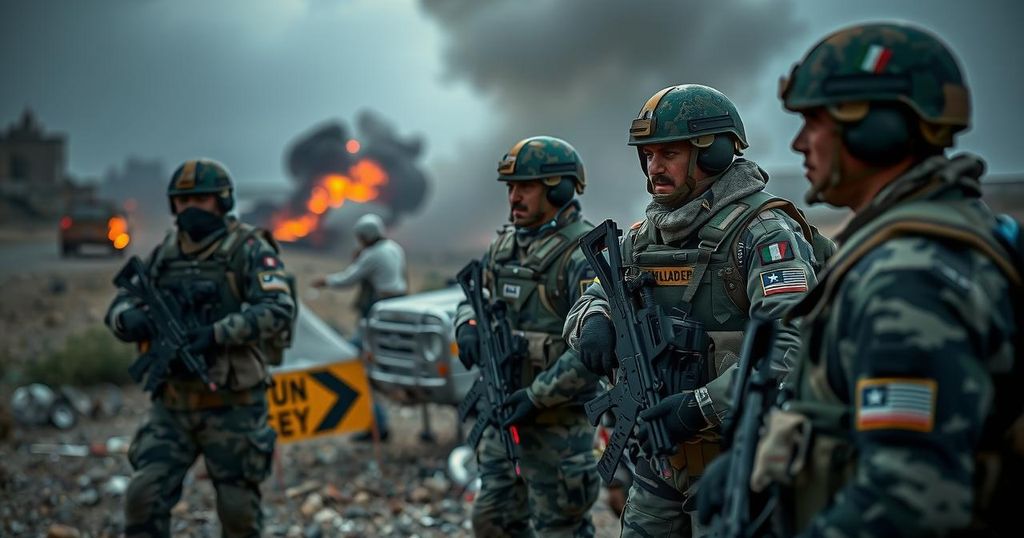Four Italian UN peacekeepers were injured by a rocket attack in Lebanon as Israeli airstrikes intensified, resulting in multiple casualties among medical personnel in the area. The attacks followed diplomatic efforts led by US envoy Amos Hochstein aimed at resolving the ongoing conflict between Israel and Hezbollah, which is now in its 52nd day. Prime Minister Giorgia Meloni and UNIFIL officials condemned the violence and called for enhanced protection of peacekeepers.
On Friday, as Israeli airstrikes continued in southern Lebanon and Beirut, four Italian UN peacekeepers suffered injuries from a rocket attack on their headquarters in Shamaa. These attacks escalated just after US envoy Amos Hochstein’s departure from Tel Aviv, following discussions regarding a diplomatic resolution to the ongoing conflict involving Hezbollah and the Israeli army, now in its 52nd day. The situation has prompted responses from both Italian and UN officials regarding the safety and security of peacekeeping forces in the region.
The attacks in southern Lebanon intensified, with Israel launching airstrikes that resulted in the reported deaths of at least five medical workers. Following the rocket strikes on the UNIFIL headquarters, Prime Minister Giorgia Meloni expressed her outrage, calling the attacks “unacceptable” and urging for increased protection for UN personnel. The injuries sustained by the peacekeepers were not life-threatening, and they were receiving care at their base’s hospital.
Israeli forces continued their operations, entering locations such as Deir Mimas and conducting airstrikes in predominantly civilian areas, leading to significant destruction and panic among the local population. Reports of targeted attacks on ambulances and the targeting of Hezbollah’s medical resources further escalated tensions, prompting calls from the Lebanese Ministry of Health to halt these breaches of international law.
In response, Hezbollah stated they targeted Israeli troops in Shamaa, claiming to have hit an Israeli tank. The situation has resulted in widespread distress among residents, sparked by evacuation warnings and ongoing military engagements. Amid these hostilities, Lebanese citizens commemorated their national independence while expressing solidarity against the backdrop of violence and instability.
In conclusion, the conflict between Israel and Hezbollah persists, reflecting a complex humanitarian crisis, with significant implications for local security and regional stability. The involvement of international peacekeeping forces, specifically UNIFIL, raises questions about the safety of these personnel amid escalating military actions and targeted attacks. The international community’s response will be crucial in addressing not only the humanitarian needs but also the overarching challenge of peace in the region.
“These attacks are unacceptable” – Giorgia Meloni.
“UNIFIL strongly urges combating parties to avoid fighting next to its positions” – UNIFIL.
There are no specific links referenced in the text.
The conflict between Israel and Hezbollah has been ongoing, with significant military engagements and humanitarian casualties reported. UN peacekeeping forces, including those from Italy, are present in the region to monitor the ceasefire and assist with the aftermath of violence. The political climate remains volatile, with diplomatic efforts in play, yet actual developments on the ground tend to escalate fighting rather than resolve it. This backdrop of sustained conflict has raised severe concerns regarding the safety of international peacekeepers and local civilians alike.
The recent attacks in Lebanon, which injured Italian UN peacekeepers and resulted in civilian fatalities, highlight the increasing danger of the ongoing military confrontations between Israeli forces and Hezbollah. The situation calls for urgent international attention to protect humanitarian efforts and maintain peace and security in the region. The responses from national leaders and the United Nations emphasize the need for safeguarding peacekeeping forces and fostering dialogue to bring about a resolution to this prolonged conflict.
Original Source: www.arabnews.com






